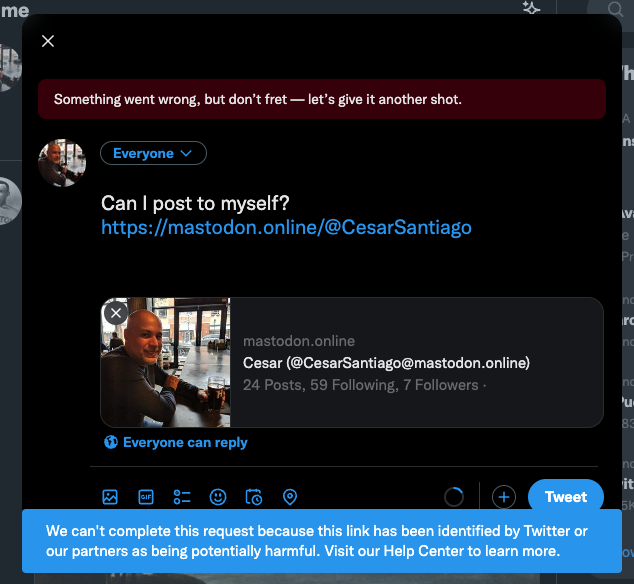Once, someone that thought I was some sort of boss asked if it was ok to skip an all hands meeting that was advertised as an in-person required meeting. The reason? They needed to pick up their kids at school.
Of course it’s ok. Always. Never, ever be afraid to skip a meeting to go pick up your kids. Or have dinner with your spouse. Or just go have a beer with good friends you haven’t seen in a while.
Trust me: the meeting could have been an email.
Social Media Retirement
For the past couple of months I’ve not posted anything on social media. I’ve limited myself to liking specific life events for some friends and family and that has been it. Let me tell you, it has been… cleansing.
I’ve learned that my opinion is of no one’s interest. I’ve learned that I should just let people enjoy things.
And if someone is dead wrong… Let them live their lives based on their conclusions and I’ll live mine according to mine. Outcomes will sort everything out.
Predatory Mobile Phone Apps
My mother got a brand new Samsung phone two days ago and I was shocked to find that it was showing her misleading full screen ads about her phone memory being full and how she needed to download some cleanup program from the Google store. She was not even browsing so I deduced that it had to be some built in app.
My first clue about which app it could be was a widget on her Home Screen advising her setup was not complete and that she needed to turn SMS home into her default SMS app. A web search yielded someone in Reddit complaining about the same thing.
After digging further, I found that somehow this SMS Home app had become the default launcher for the phone, which explained all the adds showing up out of nowhere. As soon as I turned Samsung’s One UI into the default launcher, the Home Screen cleared away and the ads stopped showing up… not before an Android message dialog showed up asking me to turn SMS Home into the default launcher. The app was still in memory aggressively trying to get the user of the phone to enable it again.
I finally made it all end by completely uninstalling the app. I also found that a lot of the other apps installed in her phone by default were apps of the same type: SMS apps full of adds and aggressively serving up misleading ads about installing other software.
According to my mother, she had not installed these apps. They were there by default, including the SMS Home app. This leads me to believe that her local carrier in Puerto Rico installed these apps on purpose when they gave her a brand new phone.
My mother is a non technical person and would never have caught this if I had not been around. Whoever installed the apps on what was supposed to be a pristine phone and the app makers are predators blatantly taking advantage of older non technical users
Twitter – continued
On my previous post I expressed my concerns about Elon Musk’s handling of Twitter. This week, things have gotten worse. Here are the top headlines at this time:
- Elon Musk dissolved Twitter’s Trust and Safety Board.
- Elon Musk caused Yoel Roth, former head of the board, to flee his home after falsely implying that Roth has advocated for child sexualization.
These latest happenings have prompted one of my favorite Twitter accounts, Popehat, to delete all his tweets and leave the platform. His explanation of why is very sobering. Another of my favorite accounts, pwnallthethings has also announced he’s phasing out of the platform. This sentence in his article summarizes the state of things to perfection: “There’s not much left on Twitter for me beyond the spectacle”.
I’ve made the decision to leave my account open but in private mode. I won’t be advertising it as a social media contact for myself, nor providing content. I’m not ready to completely leave the account as the platform is still relevant and has follow worthy accounts.
Still, I feel uncomfortable staying around.
My current thoughts of the state of Twitter after Elon Musk’s acquisition:
- Website performance has not suffered – yet. If it wasn’t for the news publicizing the huge number of layoffs, I’d think everything was normal. Automation probably has things on cruise control, but at some point something is gonna break and the loss of institutional knowledge will hurt them.
- The way Musk is handling layoffs and straight up dismissals is unprofessional. Twitter should be a no-go zone for developers at this point.
- Elon Musk’s sympathy for toxic accounts is a pattern now. Whether it’s because of a true belief in zero censorship or just an attempt to drive up the engagement remains unclear to me.
- Some of my favorite accounts have left for good to Mastodon. So far it’s been mostly niche accounts though.
- While the day to day site experience has not changed much, Elon Musk’s proactively catering to right wing trolls makes it harder to justify to stay by the day.
While I have not made a decision of leaving Twitter for good, I have opened an account at mastodon.online/@CesarSantiago to experiment with it.
On Quiet Quitting
“I recently learned about this term called quiet quitting, where you’re not outright quitting your job, but you’re quitting the idea of going above and beyond,” reads this NPR article about “Quiet Quitting”, the latest term for the age old concept of doing only what you’re payed to do.
Watching this term trend has made me think of things I’ve learned throughout my career as a software engineer. Here are some random bullet points
- Companies are structured to get all they can out of employees. From the moment a hiring decision is made, a company will try to get a new hire to take the lowest salary possible. After that, they’ll try to squeeze as much as they can from them. Keep that in mind.
- Did I mention companies try to squeeze as much as they can from employees? They’ll create a culture where employees essentially donate their personal devices, cell, and data plans to the company. Do you have company MSTeams, Slack or whatever else installed in your personal phone? There you go.
- “Above and beyond” is turned into the standard to get to the upper echelons. You may have heard the term “+1s”, or what in school was called “extracurricular activities”. Did I mention companies squeeze as much as they can from employees?
- There are times it is absolutely necessary to go “above and beyond”. The days leading up and during a production release are a good example. Yes, it is crunch time with crazy hours to get a piece of software into production and yes, things go on production during a weekend. This is fine. This is ok and rewarding… if your project is actually helping people.
- Going up the ladder in a company is a must to make more money. Having said that, you don’t have to keep going up. Will going to the next level mean you’ll have to do a job you hate? Will going to the next level mean you’ll have to sacrifice life with your loved ones? Know when to say “enough”.
Bottom line: don’t give all to a company and your career without personal reflection.
Goodbye, Old Friend

I can’t understate how heartbroken I am having watched the Arecibo Radio telescope fall this week. I still remember the first time I saw it as kid, just towering over the hills. Last time I saw it was in 2003 as a full grown adult, and I still looked at it in awe. It’s a goddamn tragedy.
It is a tragedy because it was such a symbol of pride. It was a symbol that it didn’t matter that you came from an island 100×35 miles wide, great things could be done in that island, and great thing could await you as well. It fed my fascination for science, for wonder, and it had a huge role in convincing me that I would be an engineer one day… and I did.
I’m angry that you were allowed to go down like that and in mourning. Good bye, old friend. You might be resurrected, perhaps looking like the radio telescope in China’s Guizhou Province, with no need for the gigantic mind blowing structure just… magically floating over a mind bending reversed dome. I’ll mourn that, but if it inspires another generation of kids from a small island to think they can be whatever they want… I’m ok with that.
My experience with Amazon Ring indoor cameras
I just bought a new house and got a Ring security system, controversies notwithstanding. Having said that, once I got everything in place, it became clear I was very uncomfortable with the indoor cameras I installed.
By default, the cameras are activated by motion and they upload 30 secs clip into the cloud. Eventually I figured out that I could turn off motion detection and have them activate only when the house alarm went off, but even then, I could not keep my mind at ease. Who was to say the cameras were not recording? Why would I want a possible spy inside the house, 24/7? However, at the same time, I wanted the convenience of having the cameras in place for whenever I left the house which brings me to the next point: there is no way to turn the camera off with a switch. As long as the battery is in, it is potentially on, end of story. Getting the battery out is the only way to turn it off. It certainly feels like they are incentivizing you to keep the camera powered all the time.
Ultimately, I decided to keep the battery lid unscrewed so I can take the batteries in and out with ease and make sure I’m not being unwittingly recorded when I’m home. When I know I’ll be out for an extended period of time, I put the batteries in and put the cameras in place. Without the screws, it is a very quick and straightforward thing to do. The batteries also snap in place, so if you wanted to, you can keep the lid off and make taking the batteries in and out even easier.
So far, I’m comfortable with this compromise. I’m 100% sure I’m not being recorded when I’m home. At the same time, it gives me the peace of mind of being able to setup the cameras easily before going away so that I can check in on the house anytime, or that if someone gets in, all cameras will turn on and upload evidence to the cloud automatically.
I feel good with this compromise, but the clear incentives to have the cameras on or on standby all the time sure are disconcerting.
Shackles
I love my Nexus. Its the best phone I’ve ever had. I don’t know how I would find my way around town without it. Streaming Google Music + NPR radio shows with it over the car’s Bluetooth connection means I don’t have to listen to over the air radio anymore. Oh, and it makes calls and sends text messages. Yeah, seems it does that too.
On the other hand, I have found myself struggling with its negatives. Joshua Fields Millburn from The Minimalists explains it splendidly on his article Reprogramming the Twitch. Smart phones, can disconnect us from the world. Just look around you next time you are having dinner with friends, family and even your spouse. Odds are that at some point them (and you!) will all be looking at their phones, completely disconnected from each other and the moment you are all supposed to be experiencing.
I have been making a conscious effort of keeping the phone in my pocket whenever I’m with people. Its been a hard habit to break, though. Many times I find myself unconsciously going for the phone while in conversation and stopping myself. Its been a pain, but I like to think I’m making progress with it. However, there is one particular aspect of breaking this dependence on my phone that I find extremely difficult and distressing: the perceived need, even duty, to respond to communications immediately (or within the hour).
Am I being rude if I chose not to answer because I’m not in the mood? What if I don’t really want to talk to anybody for the rest of the day or the rest of the weekend for that matter? Am I causing worry and distress if I don’t return the message? After all, if I’m not responding to calls, text messages, emails or Facebook messages something bad could have happened to me. Going off the grid feels impossible. Feels like I’m shackled to every single person I know.
My imperfect answer right now is: if it is immediate family, and by that I mean siblings and parents, I’ll answer promptly. My close friends, who number in the low single digits, will also get a prompt answer. Anyone else, I have set the expectation that if I’m not in the same room with them, I am out of reach and I may not even call back. I will talk to them next time I see them. The phone should be a tool to facilitate my communications, not a device that makes it impossible to live my own life uninterrupted.
Fortunately, the same technology that creates these shackles helps me free myself from them too. One feature I have enabled in the phone is Downtime: after 10pm in the evening I will be alerted only to calls and text messages from a select set of contacts which happen to be the same close friends and family I mentioned before. This happens automatically after a one time setup. I can also enable it manually when I don’t wish to be interrupted. Another rule is to never have my work email in my phone. Once I’m out of the office, I’m gone. I have made my coworkers aware of this fact and I’m surprised at how the most prevalent reaction has been “how could you do that?”. My own has been “why would you have work emails in your personal phone?”. But that’s a subject for a separate post.

